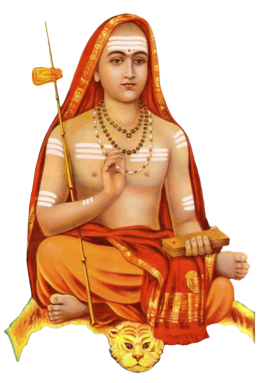सत्यमुक्तं त्वया विदन्निपुणोऽसि विचारणे ।
अहमादिविकारास्ते तदभावोऽयमप्यनु ॥ २१३ ॥
तमात्मानं वेदितारं विद्दि बुद्ध्या सुसूक्ष्मया ॥ २१४
Through the sharpest intellect—An echo of Katha Upanishad I. iii. 12. *?*în«i*3»î?Tní írrr^rá sîptjs^ ir^xii
कस्याप्यननुभूतार्थे साक्षित्वं नोपयुज्यते ॥ २१५ ॥
kasyāpyananubhūtārthe sākṣitvaṃ nopayujyate || 215 ||
अतः परं स्वयं साक्षात्प्रत्यगात्मा न चेतरः ॥ २१६ ॥
ataḥ paraṃ svayaṃ sākṣātpratyagātmā na cetaraḥ || 216 ||
प्रत्यग्रूपतया सदाहमहमित्यन्तः स्फुरन्नैकधा ।
नानाकारविकारभागिन इमान् पश्यन्नहंधीमुखान्
नित्यानन्दचिदात्मना स्फुरति तं विद्धि स्वमेतं हृदि ॥ २१७ ॥
pratyagrūpatayā sadāhamahamityantaḥ sphurannaikadhā |
nānākāravikārabhāgina imān paśyannahaṃdhīmukhān
nityānandacidātmanā sphurati taṃ viddhi svametaṃ hṛdi || 217 ||
आलोक्य मूढो रविमेव मन्यते ।
तथा चिदाभासमुपाधिसंस्थं
भ्रान्त्याहमित्येव जडोऽभिमन्यते ॥ २१८ ॥
ālokya mūḍho ravimeva manyate |
tathā cidābhāsamupādhisaṃsthaṃ
bhrāntyāhamityeva jaḍo’bhimanyate || 218 ||
विहाय सर्वं विनिरीक्ष्यतेऽर्कः ।
तटस्थ एतत्त्रितयावभासकः
स्वयंप्रकाशो विदुषा यथा तथा ॥ २१९ ॥
vihāya sarvaṃ vinirīkṣyate’rkaḥ |
taṭastha etattritayāvabhāsakaḥ
svayaṃprakāśo viduṣā yathā tathā || 219 ||
विसृज्य बुद्धौ निहितं गुहायाम् ।
द्रष्टारमात्मानमखण्डबोधं
सर्वप्रकाशं सदसद्विलक्षणम् ॥ २२0 ॥
अन्तर्बहिःशून्यमनन्यमात्मनः ।
विज्ञाय सम्यङ्निजरूपमेतत्
पुमान् विपाप्मा विरजो विमृत्युः ॥ २२१ ॥
The sense of various Sruti passages of Advaitic import is reproduced in these Slokas. The reader
is specially ferred to the Brihadáranyaka III. viii. &, iva II. 2. and SvetâsvaUua III. 8.
येनाद्वितीयमानन्दं ब्रह्म सम्पद्यते बुधैः ॥ २२३ ॥
yenādvitīyamānandaṃ brahma sampadyate budhaiḥ || 223 ||
विज्ञातव्यमतः सम्यग्ब्रह्माभिन्नत्वमात्मनः ॥ २२४ ॥
vijñātavyamataḥ samyagbrahmābhinnatvamātmanaḥ || 224 ||
नित्यानन्दैकरसं प्रत्यगभिन्नं निरन्तरं जयति ॥ २२५ ॥
nityānandaikarasaṃ pratyagabhinnaṃ nirantaraṃ jayati || 225 ||
Vivekachudamani – Introduction
1: Devoted Dedication
2: Glory of Spiritual Life
3: Unique Graces in Life
4-7: Miseries of The Unspiritual Man
8-13: Means of Wisdom
14-17: The Fit Student
18-30: The Four Qualifications
31: Bhakti – Firm and Deep
32-40: Courtesy of Approach and Questioning
41-47: Loving Advice of the Guru
48-49: Questions of the Disciple
50: Intelligent Disciple – Appreciated
51-55: Glory of Self-Effort
56-61: Knowledge of the Self-Its Beauty
62-66: Direct Experience – Liberation
67-71: Discussion on Questions Raised
72-75: Gross Body
76-82: Sense Objects a Trap – Man Bound
83-86: Fascination for Body Criticised
87-91: Gross Body Condemned
92: Organs of Perception and Action
93-94: Inner Instruments
95: The Five Pranas
96-101: Subtle Body – Effects
102: Functions of Prāna
103-105: Ego Discussed
106-107: Infinite Love – the Self
108-110: Māyā – Pointed Out
111-112: Rajoguņa – Nature and Effects
113-116: Tamoguņa – Nature and Effects
117-119: Sattvaguņa – Nature and Effects
120-121: The Causal Body – Its Nature
122-123: Not-Self – Description
124-135: The Self – Its Nature
136: Advice for Self-control
137-142: What is Bondage – The Reply
143-144: The Powers – Agitation and Veiling
145-146: Bondage in Action
147-153: Ātman and Anātman – Discrimination
Negation of the Kośas
154-164: – Annamaya kośa (Food sheath)
165-166: – Prņamaya kośa (Vital air sheath)
167-183: – Manomaya kosa (Mental sheath)
184-188: – Vijnanamaya kośa (Intellectual sheath)
189-191: Ātman – Unattached
192-193: What is Liberation? – Disciple
194-206: Self-Knowledge gives Liberation
207-210: Anandamaya kośa (Bliss sheath)
211: Ātman – Other than the Five Kośas
212: What is Ātman? – Disciple
213-225: Nature of the Self – Discussion
226-236: All Manifestation Absolute
237-240: Brahman – Its Nature
241-249: That Thou Art – Explanation
250-253: Attitude in Meditation
254-266: Aids to Meditation
267-276: Give up Vāsanās – the Method
277-292: End Superimposition – The Means
293-297: The Perceived I’ Factor – False
298-309: Condemnation of the Ego
310-319: Actions, Thoughts and Vāsanās – Renounce
320-329: Total Vigilance – Its Price
330-338: In the One, No Plurality
339-348: Spiritual Growth – the Secret
349-353: Cause-Effect – False
354-372: Samadhi – Its Nature
373-378: Fully Detached – Samadhi Easy
379-383: Meditation – the Technique
384-397: Continuous Attention to Self
398-406: No Diversity in Reality
407-413: Ātma-vicāra – Contemplation
414-418: Give up Perceptions
419-425: The Science of Reality – Its Benefits
426-445: Signs of a Realised Seer
446-464: Prārabdha for a Saint
465-471: There is No Plurality
472-479: Experience of Selfhood
480-520: Practice of Knowledge – Disciple
521-575: Final Words of Advice
576-578: Blessed Disciple Liberated
579-581: The Glory of the Textbook

Vivekachudamani – Verses 213-225 – Vivekachudamani Verses 213-225 – By Adi Sankaracharya – In Sanskrit with English Meaning, Transliteration, Translation, Commenary, Lyrics, Audio – Vivekachudamani-213-225
